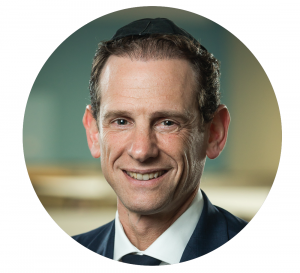How do we build the future of the Orthodox Union together? A year into my tenure at the OU, as we move past the pandemic and with the season of teshuvah upon us, it seems an opportune time for self-reflection and examination. As Rabbi Yehuda Amital, zt”l, put it in “The Teshuva of Shabbat” in When God is Near: On the High Holidays:
. . . the command, “vahashevota el l’vavecha,” “you shall take it to heart,” refers to teshuva through self-examination. . . . National teshuva results from the teshuva of individuals. There is no separate reality of the nation without the individuals, and therefore the teshuva of the individual is an integral part of the national teshuva. The two processes are intertwined, and as Hazal teach, on Rosh HaShana we pass “like a flock of sheep”—each individual on his own, while at the same time “they are taken in in a single glance” (Rosh HaShana 18a); the totality is judged as a single entity.
Thus, our review of ourselves at the OU is unavoidably tied to our belonging to a larger whole. When we manage our personnel review process, for example, we speak both of individual areas of opportunity for growth, as well as investing in departmental and organizational needs and yearnings. Indeed, much of the past year has been focused on learning about the dizzying array of projects, programs, supports and services that inhere the conglomeration we call the OU. A smattering of recent activity includes:
– Yachad is releasing a new resource and referral service called REACH with a soft launch that began in July and a full launch by September. This program, available to any individual with an intellectual, developmental or learning disability in the Jewish community, will have a dedicated hotline where a professional will get to know the individual’s needs, spend time with their family members, and make specific referrals that best suit him or her.
– On May 24, Israel Free Spirit: Birthright Israel welcomed the first Birthright group of young adults to Israel since the start of the pandemic.
– NCSY welcomed over 2,000 teens on programs this summer, including nearly 1,600 in Israel.
– The All Daf app has surpassed 100,000 users!
– The OU Women’s Initiative launched the Max and Yetty Monderer, a”h, ALIT Summer Virtual Beit Midrash during the month of July. This annual summer program provides in-depth text-based learning on topics related to halachah, Tanach, tikkun hamiddot and Jewish history.
– Tachlis Media, a brand-new podcast platform of sophisticated and thought-provoking content launched in July.
– OU Advocacy initiated the “Unite and Advocate” Campaign in May and June in response to the rocket attacks in Israel and anti-Semitic assaults in the US. In the first three weeks of the program, 100 community members nationwide joined group meetings with their local members of Congress.
One discovery we have spent some time considering is the essence of the OU’s culture within the workplace and beyond. As an organization that is dedicated to the promotion of Torah and mitzvot, we must ensure that our conduct as an organization and as personnel lives up to our values of integrity, loyalty, kindness, shared responsibility, modesty and humility, and sets standards that must characterize our individual and organizational behavior. As such, we have sought greater opportunities to marry our internal and external activities. For example, the Community Projects and Partnerships Department started a new initiative to strengthen parent-child relationships. Its initial volunteer project, offered to OU professionals and their families, was re-painting the OHEL Children’s Home and Family Services center in Lower Manhattan.
That programmatic experience has been supplemented through more collaborative and culturally resonant experiences for all OU employees. From open town halls with Q&A sessions, to a department directors’ retreat on cultural opportunities for change, to a staff survey to determine further learnings, we aspire to reset and to catalyze teshuvah across the organization as we emerge from a life-changing and world-altering moment. As we have all experienced, sometimes we need a factory reset on one of our tech gadgets. This season of reset allows for self-reflection, self-examination, acknowledgment of challenges and areas of opportunity for growth, and finally a commitment to start again.
If teshuvah or resetting on an individual level is challenging, then doing so at the national or corporate level adds complexity to the point of confrontation and a need for engagement. In a 2010 study of oil riggers entitled “Unmasking Manly Men,” authors Ely and Meyerson noted in the Harvard Business Review that:
. . . the platforms we studied have deliberately jettisoned their hard-driving, macho cultures in favor of an environment in which men admit when they’ve made mistakes and explore how anxiety, stress, or lack of experience may have caused them; appreciate one another publicly; and routinely ask for and offer help. These workers shifted their focus from proving their masculinity to larger, more compelling goals: maximizing the safety and well-being of coworkers and doing their jobs effectively.
The shift they described required a new approach and demanded a new attitude toward work where exposing errors to learn from them is accepted and encouraged. Employees learned to be open to new information that challenged their assumptions, and to acknowledge when they were wrong: “. . . the ones who excelled were mission-driven guys who cared about their fellow workers, were good listeners, and were willing to learn.”
In the coming months we hope to continue to work on developing our organizational culture in a positive, safe and secure Torah environment that promotes and develops ambitious, creative, passionate professionals with an elevated mission. How do we build the future together? One step forward is to reset our culture through collaboration, learning and applying our values.
Rabbi Dr. Josh Joseph is OU Executive Vice President/Chief Operating Officer.
